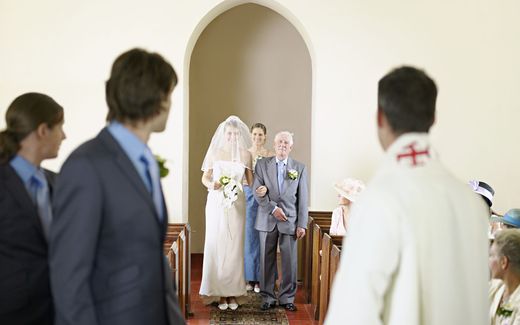Does marriage really make us happier than living together?

Jeongim Kwon
Christian Life
Unmarried couples should not have sex before marriage. And two lovers should not cohabit until they are married. These statements are not outdated, science shows. Research demonstrates that the Biblical teachings on marriage and sexuality have great benefits for people. “Men tend to live longer when they are married.”
The German theologian Markus Voss and his wife Elisa spent ten months researching the topic. The couple found out that cohabitation without marriage is not only rejected from a Biblical perspective but that scientific findings point that direction too.
“There is not one single reason why people should cohabit before or without getting married”, Markus says confidently. “We reviewed over fifty studies, and they all show that there are no advantages. But the potential downsides are tremendous.”

Tax benefits
Overall, young Evangelical Christians still believe it is not a good idea to cohabit without marriage, but they often do not know how to explain this to their friends who have a different view. Unmarried living together is widely popular in Germany. Currently, there are more Germans that move in together without marriage than there are people of the same age getting married. Even tax benefits cannot convince many people in Germany to get married over moving in together without a wedding.
The topic of cohabitation is not something that is talked about much in Germany, Elisa says. “There is not even a specific German word that describes the phenomenon as there is in English.” With their research, she and her husband want to break the taboo and warn young couples against cohabitation, backing their reasoning with scientific findings. Therefore, they made a two-hour long video for their online ministry Bibelfit.
Biblical guidelines
During their research, Markus and Elisa were surprised with the outcomes of scientific studies as they backed up the Biblical teachings about marriage, sexuality and cohabitation. The Bible is clear on these issues, they believe: cohabitation without marriage is wrong. The starting point for the life of Christians today should be the New Testament, Markus argues. There, Paul, for example, speaks about Christians who moved in together, the theologian points out. And in doing so, the apostle consistently uses a Greek word which also means marriage. And using the example of the Samaritan woman at the well, Markus points out that Jesus speaks about fornication there. “This woman lived together with a man, but Jesus says that he is not her husband. From Matthew 15 and Mark 7, it is also abundantly clear that Jesus judges fornication.”
For Markus and Elisa, the Biblical guidelines stand above science, they say when asked what they would have done if their scientific research had shown the opposite. Therefore, no matter what, they would have propagated the Biblical idea that cohabitation without marriage is wrong. "We would have encouraged our community to live according to the teachings of Jesus and the New Testament regardless, despite the lack of worldly benefits”, Markus says. “Because it is more important to follow Jesus than to improve one’s happiness or the quality of your relationship”.
Happier marriage
Often the couple hears from young people that they want to cohabit before getting married, because they want to be sure that their significant other is the best spouse for them. “Couples who have their hopes up that they will have a happier marriage if they cohabit first often end up disappointed”, Elisa adds. “There is no area in which cohabiting partners score higher than married couples.”
On the contrary, the Voss couple found out that married partners are generally happier and have a better relationship than their unmarried cohabiting peers. Many factors contribute to that, but the red thread through them seems to be stability, or rather, the lack of it in unmarried cohabitations.

Couples who are married are usually much more in for a longer investment, Markus explains. People who cohabit may not resolve to reconcile after every little disagreement, because they have the unconscious feeling that they can leave the relation anytime if their partner is not suitable after all, he suspects. For married partners, the stake is much higher, he believes. “If my wife and I keep little disagreements in the air, we will live in a fight for maybe even the next fifty or sixty years. That is not something you want, because unresolved fights can be the start of separation and divorce.” Research shows, for example, that married couples who cohabited first, have a higher risk of divorce.
Another factor is that married spouses have vowed each other sexual exclusivity. Research shows that married couples are overall more faithful than cohabiting couples and those who cohabited prior to marriage. A stable sexual relationship is something that contributes to the greater stability in married relationships compared to those who cohabit without marriage, Elisa says. That leads to a higher quality of marriage, she and her husband discovered during their study. “They feel more sexually fulfilled, and overall experience less violence”, she says. The latter is because people who start dating with the intention of getting married tend to be more deliberate and selective than those who move in together without a wedding”
Responsibility
In addition, marriage has health benefits, while cohabitation does not, scientific research from Harvard University and others shows. Men tend to live longer when married, Elisa points out. “Women restrain them from risky behaviour”, she jokes. But joke or not, studies show that marriage changes men, Markus says. “They go about their life in a more responsible way. They drink less, smoke less and even take greater responsibility for their finances.” Even though the couple’s research did not target the underlying reasons for the health benefits of marriage, Markus believes that men and women who are married unconsciously go for the long-term investment, which includes living healthy and responsibly. Cohabiting lovers overall tend to shy away from this long-term thinking, studies show.
Demography
The increasing number of cohabiting unmarried couples cannot be without consequences for society, both Markus and Elisa believe. “I cannot imagine that the negative effects of unmarried cohabitation on relationships will not have a negative impact on society as well”, Markus says. These implications can play out in different areas of life, he points out.
First of all, more cohabitating couples is bad news for the demography. Research from the University of Pennsylvania among others, shows that unmarried spouses who live together generally have fewer children than those who are married. In addition, the number of abortions is higher among unmarried women than among those who are married. And in the light of the declining demography all over Europe, this is a bad thing.
Faith
In addition, unmarried cohabitation can pose a serious problem for the Christian community in Germany, the Voss couple warns. “Moving in before marriage has a negative impact on faith in general”, Markus says. Studies show that people may be practicing Christians when they move in together, but they are at a much higher risk of leaving their faith compared to their married peers.
And the problem is that it is difficult to change the tide when it comes to marriage and cohabitation, Markus fears. “Children replicate their parents, also in relationships. More and more children are born out of wedlock, the number of single parent households is growing. I cannot imagine that this will be conducive to a happy and healthy society.”
Conversation
Finally, Markus has two pieces of advice to Christians when it comes to the topic of marriage and cohabitation. First, he emphasises the necessity of talking about these subjects with the children and young people in your surroundings. “If we don't talk to them about this, they will automatically look at what society does. And the secular community will take our opportunity to teach them its values”, he says.
The second piece of advice is related to the first: don't wait too long with this conversation, Markus says. The talk should have happened within religious communities, small groups or families before the topic actually becomes a hot button issue, he stresses. “Do it before young people get into a relationship and cannot think clear. Then it is very hard to start thinking about it, as they are very in love and cannot see clearly.” Pro-active conversations should therefore be the norm, Markus says. “Don't leave it up to society to teach our young people and don't leave the latter to figure it out themselves.”
What is Bibelfit?
Markus Voss, with the help of his wife Elisa and their team, runs a ministry together called Bibelfit. This is an online ministry that aims to equip Christians in German-speaking countries in apologetics, discipleship and Bible studying. The couple noticed that many Christians, especially young converts, do not know how to apply the Biblical teachings to their everyday life. Therefore, they attempt to help Christians with online materials to explain discipleship to them, among other things. “We try to cover important topics from a non-denominational perspective”, Markus Voss says. Bibelfit is not connected to any church denomination.
Related Articles











